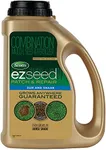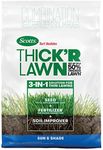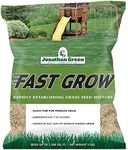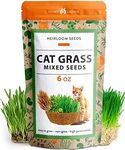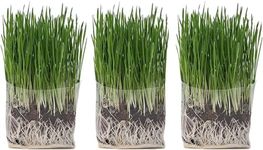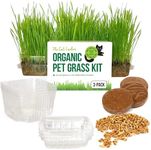Buying Guide for the Best Grass Seed For Maryland
Choosing the right grass seed for your lawn in Maryland involves understanding the local climate, soil type, and your specific lawn needs. Maryland has a diverse climate with hot summers and cold winters, so selecting a grass type that can thrive in these conditions is crucial. Additionally, consider factors such as the amount of sunlight your lawn receives, the level of foot traffic, and your maintenance preferences. By evaluating these aspects, you can ensure a lush, healthy lawn that meets your expectations.Grass TypeThe type of grass seed you choose is important because different grasses thrive in different climates and conditions. In Maryland, cool-season grasses like Kentucky Bluegrass, Tall Fescue, and Perennial Ryegrass are popular choices. Kentucky Bluegrass is known for its lush, dark green appearance and ability to spread, making it ideal for high-traffic areas. Tall Fescue is drought-resistant and can handle a variety of soil types, making it a versatile option. Perennial Ryegrass germinates quickly and provides a dense, attractive lawn. Consider your lawn's specific conditions and choose a grass type that matches your needs.
Sunlight RequirementsSunlight requirements refer to the amount of sunlight a grass type needs to thrive. Some grasses need full sun, while others can tolerate shade. For example, Kentucky Bluegrass and Perennial Ryegrass prefer full sun to partial shade, while Tall Fescue can handle more shade. Assess the amount of sunlight your lawn receives throughout the day and choose a grass seed that matches those conditions. If your lawn has a mix of sun and shade, consider a seed blend that includes varieties suited for both.
Drought ToleranceDrought tolerance is the ability of grass to withstand periods of low water availability. This is important in Maryland, where summers can be hot and dry. Tall Fescue is known for its excellent drought tolerance, making it a good choice if you want a low-maintenance lawn that requires less watering. Kentucky Bluegrass, while beautiful, requires more water to stay healthy. Consider your willingness and ability to water your lawn regularly when choosing a grass seed with the appropriate drought tolerance.
Foot Traffic ToleranceFoot traffic tolerance refers to how well a grass type can handle being walked on frequently. If your lawn will be used for activities like playing, entertaining, or pets, you'll need a grass that can withstand wear and tear. Kentucky Bluegrass and Tall Fescue are both good options for high-traffic areas due to their durability and ability to recover from damage. If your lawn will see minimal foot traffic, you have more flexibility in your choice of grass seed.
Soil Type CompatibilitySoil type compatibility is the ability of grass to grow well in the specific soil conditions of your lawn. Maryland soils can vary, but they are often clay-based. Tall Fescue is adaptable to a wide range of soil types, including clay, making it a reliable choice. Kentucky Bluegrass prefers well-drained, fertile soils, so it may require soil amendments if your soil is heavy clay. Conduct a soil test to determine your soil type and choose a grass seed that will thrive in those conditions.
Maintenance RequirementsMaintenance requirements refer to the level of care a grass type needs to stay healthy and attractive. Some grasses require frequent mowing, fertilizing, and watering, while others are more low-maintenance. Tall Fescue is relatively low-maintenance, needing less frequent mowing and watering compared to Kentucky Bluegrass, which requires more regular care to maintain its lush appearance. Consider how much time and effort you are willing to invest in lawn care when selecting a grass seed.
